BBS301: ShopHere Ethical Consumerism Research Methodology Project
VerifiedAdded on 2023/04/20
|10
|1792
|153
Project
AI Summary
This research project focuses on analyzing the attitude-behavior gap among ethical consumers of ShopHere, a national multichannel retailer transitioning to ethically sourced products. The study aims to analyze the effect of ethical consumerism on ShopHere's marketing strategies, examine purchase intentions, identify the attitude-behavior gap, and recommend strategies to minimize discrepancies. The research employs a positivism philosophy, a deductive approach, and descriptive designs, utilizing both survey and interview methods with a mixed-methods approach. Data collection involves primary data through surveys and interviews, and secondary data from peer-reviewed journals. Data analysis includes both qualitative and quantitative techniques, using SPSS for quantitative data and interpretation of interview transcripts for qualitative data. The project acknowledges limitations such as time constraints and resource availability, and emphasizes adherence to ethical guidelines throughout the research process, including informed consent and proper referencing to avoid plagiarism. The research utilizes focus group schedules and short surveys as research tools to gather data on consumer attitudes and behaviors, providing unbiased data for decision-making and offering reflections on consumer perspectives. The project's methodology section details research aims, objectives, questions, design, sampling, data collection, and analysis, along with limitations and ethical considerations. The provided appendix includes a survey questionnaire exploring gender, age, income, qualification, product preferences, purchase intentions, and employee interactions.
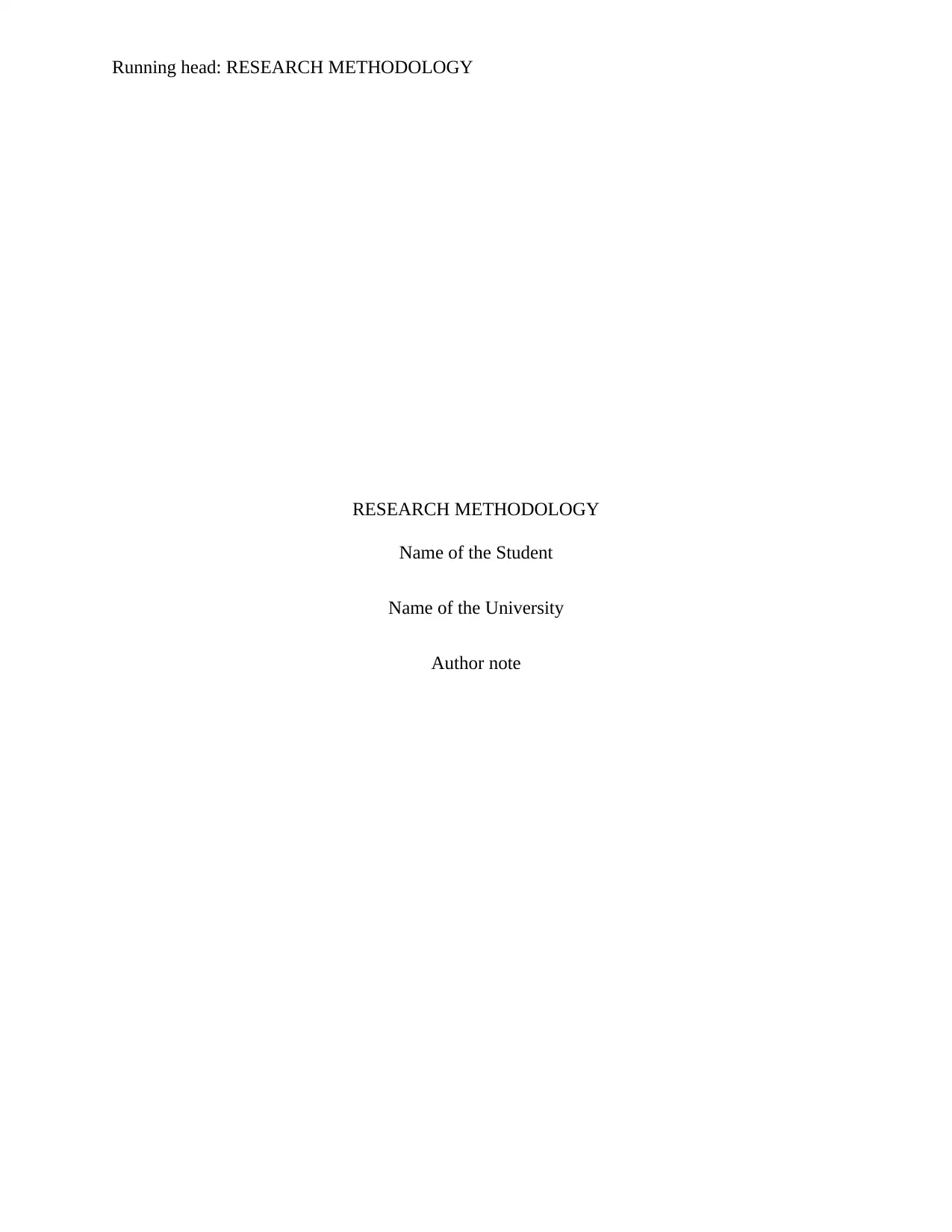
Running head: RESEARCH METHODOLOGY
RESEARCH METHODOLOGY
Name of the Student
Name of the University
Author note
RESEARCH METHODOLOGY
Name of the Student
Name of the University
Author note
Paraphrase This Document
Need a fresh take? Get an instant paraphrase of this document with our AI Paraphraser
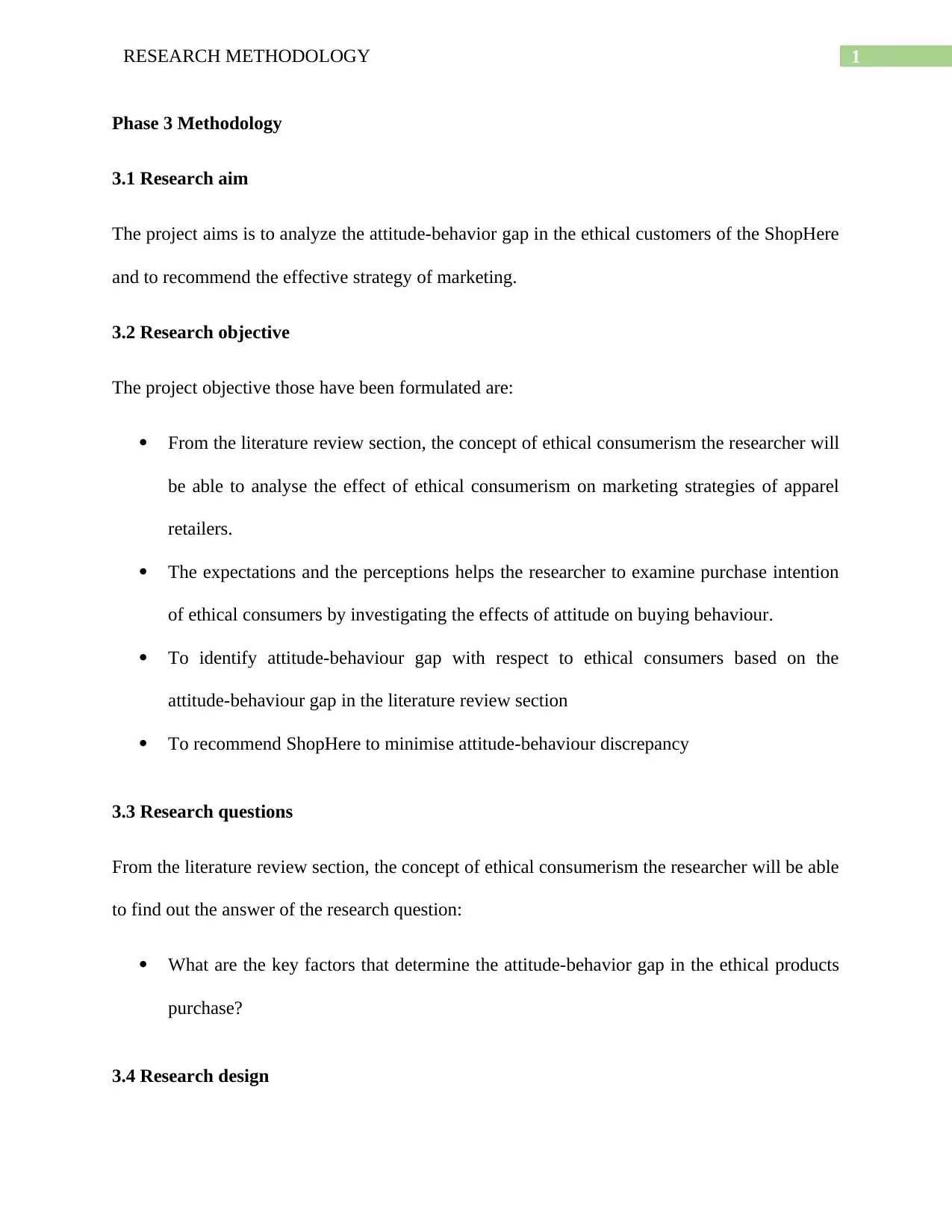
1RESEARCH METHODOLOGY
Phase 3 Methodology
3.1 Research aim
The project aims is to analyze the attitude-behavior gap in the ethical customers of the ShopHere
and to recommend the effective strategy of marketing.
3.2 Research objective
The project objective those have been formulated are:
From the literature review section, the concept of ethical consumerism the researcher will
be able to analyse the effect of ethical consumerism on marketing strategies of apparel
retailers.
The expectations and the perceptions helps the researcher to examine purchase intention
of ethical consumers by investigating the effects of attitude on buying behaviour.
To identify attitude-behaviour gap with respect to ethical consumers based on the
attitude-behaviour gap in the literature review section
To recommend ShopHere to minimise attitude-behaviour discrepancy
3.3 Research questions
From the literature review section, the concept of ethical consumerism the researcher will be able
to find out the answer of the research question:
What are the key factors that determine the attitude-behavior gap in the ethical products
purchase?
3.4 Research design
Phase 3 Methodology
3.1 Research aim
The project aims is to analyze the attitude-behavior gap in the ethical customers of the ShopHere
and to recommend the effective strategy of marketing.
3.2 Research objective
The project objective those have been formulated are:
From the literature review section, the concept of ethical consumerism the researcher will
be able to analyse the effect of ethical consumerism on marketing strategies of apparel
retailers.
The expectations and the perceptions helps the researcher to examine purchase intention
of ethical consumers by investigating the effects of attitude on buying behaviour.
To identify attitude-behaviour gap with respect to ethical consumers based on the
attitude-behaviour gap in the literature review section
To recommend ShopHere to minimise attitude-behaviour discrepancy
3.3 Research questions
From the literature review section, the concept of ethical consumerism the researcher will be able
to find out the answer of the research question:
What are the key factors that determine the attitude-behavior gap in the ethical products
purchase?
3.4 Research design
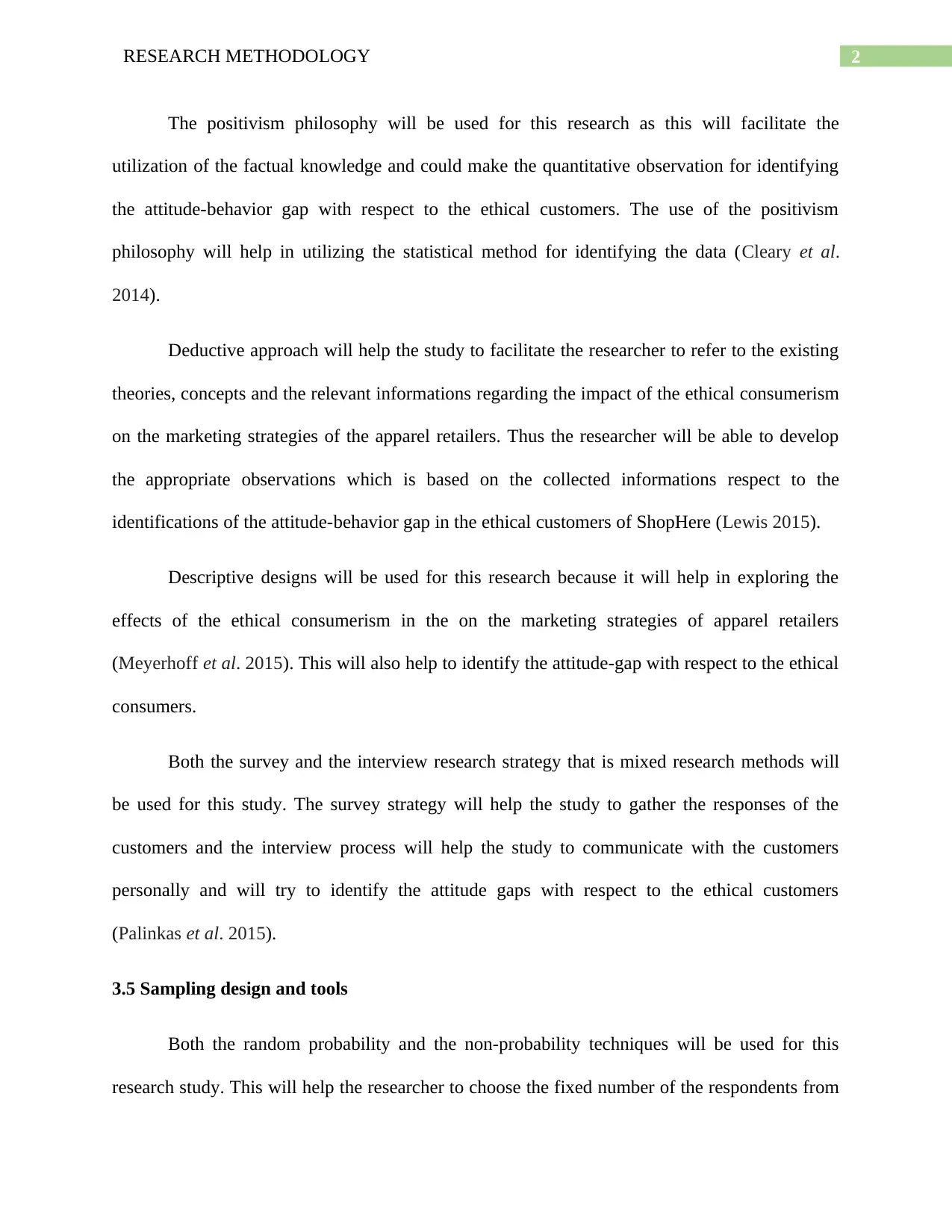
2RESEARCH METHODOLOGY
The positivism philosophy will be used for this research as this will facilitate the
utilization of the factual knowledge and could make the quantitative observation for identifying
the attitude-behavior gap with respect to the ethical customers. The use of the positivism
philosophy will help in utilizing the statistical method for identifying the data (Cleary et al.
2014).
Deductive approach will help the study to facilitate the researcher to refer to the existing
theories, concepts and the relevant informations regarding the impact of the ethical consumerism
on the marketing strategies of the apparel retailers. Thus the researcher will be able to develop
the appropriate observations which is based on the collected informations respect to the
identifications of the attitude-behavior gap in the ethical customers of ShopHere (Lewis 2015).
Descriptive designs will be used for this research because it will help in exploring the
effects of the ethical consumerism in the on the marketing strategies of apparel retailers
(Meyerhoff et al. 2015). This will also help to identify the attitude-gap with respect to the ethical
consumers.
Both the survey and the interview research strategy that is mixed research methods will
be used for this study. The survey strategy will help the study to gather the responses of the
customers and the interview process will help the study to communicate with the customers
personally and will try to identify the attitude gaps with respect to the ethical customers
(Palinkas et al. 2015).
3.5 Sampling design and tools
Both the random probability and the non-probability techniques will be used for this
research study. This will help the researcher to choose the fixed number of the respondents from
The positivism philosophy will be used for this research as this will facilitate the
utilization of the factual knowledge and could make the quantitative observation for identifying
the attitude-behavior gap with respect to the ethical customers. The use of the positivism
philosophy will help in utilizing the statistical method for identifying the data (Cleary et al.
2014).
Deductive approach will help the study to facilitate the researcher to refer to the existing
theories, concepts and the relevant informations regarding the impact of the ethical consumerism
on the marketing strategies of the apparel retailers. Thus the researcher will be able to develop
the appropriate observations which is based on the collected informations respect to the
identifications of the attitude-behavior gap in the ethical customers of ShopHere (Lewis 2015).
Descriptive designs will be used for this research because it will help in exploring the
effects of the ethical consumerism in the on the marketing strategies of apparel retailers
(Meyerhoff et al. 2015). This will also help to identify the attitude-gap with respect to the ethical
consumers.
Both the survey and the interview research strategy that is mixed research methods will
be used for this study. The survey strategy will help the study to gather the responses of the
customers and the interview process will help the study to communicate with the customers
personally and will try to identify the attitude gaps with respect to the ethical customers
(Palinkas et al. 2015).
3.5 Sampling design and tools
Both the random probability and the non-probability techniques will be used for this
research study. This will help the researcher to choose the fixed number of the respondents from
⊘ This is a preview!⊘
Do you want full access?
Subscribe today to unlock all pages.

Trusted by 1+ million students worldwide
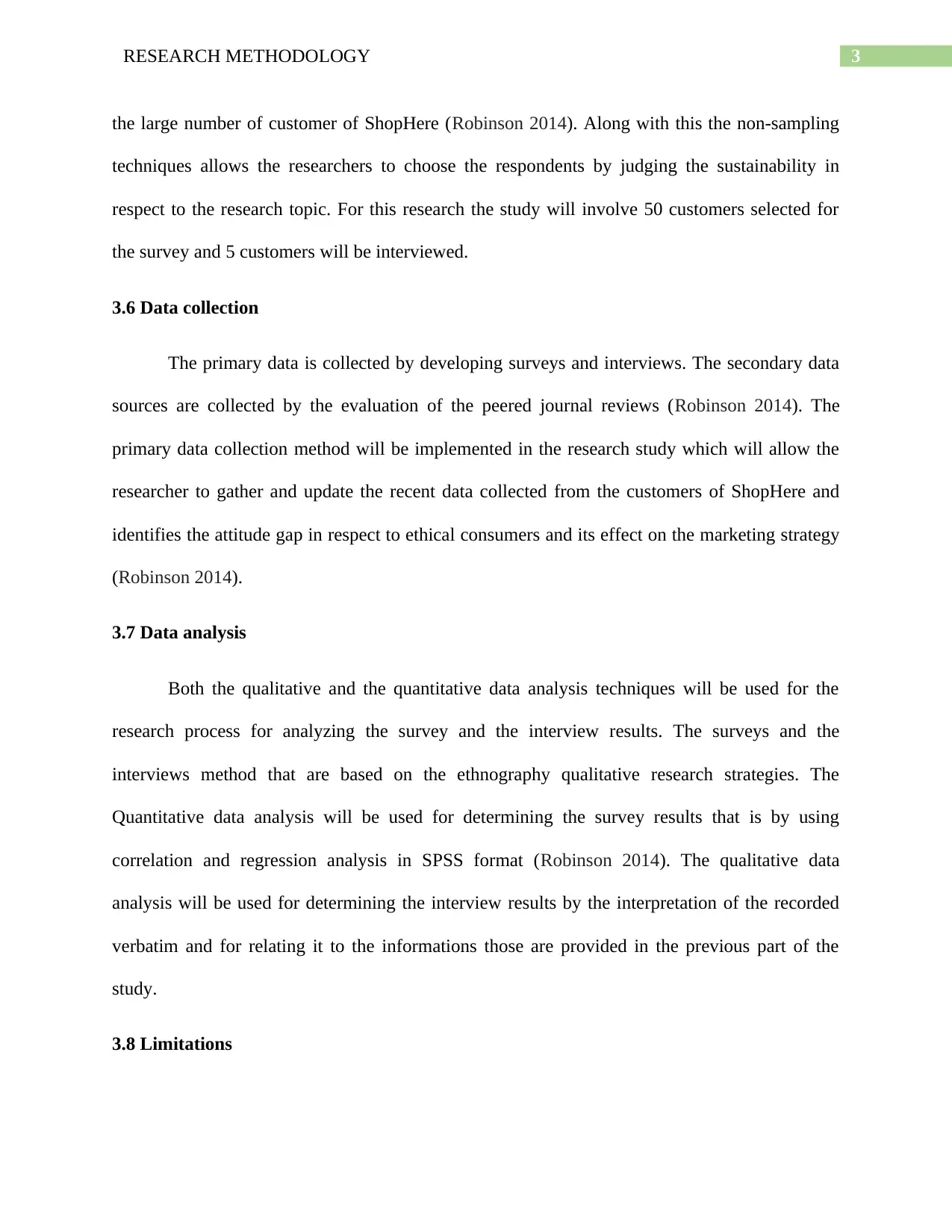
3RESEARCH METHODOLOGY
the large number of customer of ShopHere (Robinson 2014). Along with this the non-sampling
techniques allows the researchers to choose the respondents by judging the sustainability in
respect to the research topic. For this research the study will involve 50 customers selected for
the survey and 5 customers will be interviewed.
3.6 Data collection
The primary data is collected by developing surveys and interviews. The secondary data
sources are collected by the evaluation of the peered journal reviews (Robinson 2014). The
primary data collection method will be implemented in the research study which will allow the
researcher to gather and update the recent data collected from the customers of ShopHere and
identifies the attitude gap in respect to ethical consumers and its effect on the marketing strategy
(Robinson 2014).
3.7 Data analysis
Both the qualitative and the quantitative data analysis techniques will be used for the
research process for analyzing the survey and the interview results. The surveys and the
interviews method that are based on the ethnography qualitative research strategies. The
Quantitative data analysis will be used for determining the survey results that is by using
correlation and regression analysis in SPSS format (Robinson 2014). The qualitative data
analysis will be used for determining the interview results by the interpretation of the recorded
verbatim and for relating it to the informations those are provided in the previous part of the
study.
3.8 Limitations
the large number of customer of ShopHere (Robinson 2014). Along with this the non-sampling
techniques allows the researchers to choose the respondents by judging the sustainability in
respect to the research topic. For this research the study will involve 50 customers selected for
the survey and 5 customers will be interviewed.
3.6 Data collection
The primary data is collected by developing surveys and interviews. The secondary data
sources are collected by the evaluation of the peered journal reviews (Robinson 2014). The
primary data collection method will be implemented in the research study which will allow the
researcher to gather and update the recent data collected from the customers of ShopHere and
identifies the attitude gap in respect to ethical consumers and its effect on the marketing strategy
(Robinson 2014).
3.7 Data analysis
Both the qualitative and the quantitative data analysis techniques will be used for the
research process for analyzing the survey and the interview results. The surveys and the
interviews method that are based on the ethnography qualitative research strategies. The
Quantitative data analysis will be used for determining the survey results that is by using
correlation and regression analysis in SPSS format (Robinson 2014). The qualitative data
analysis will be used for determining the interview results by the interpretation of the recorded
verbatim and for relating it to the informations those are provided in the previous part of the
study.
3.8 Limitations
Paraphrase This Document
Need a fresh take? Get an instant paraphrase of this document with our AI Paraphraser
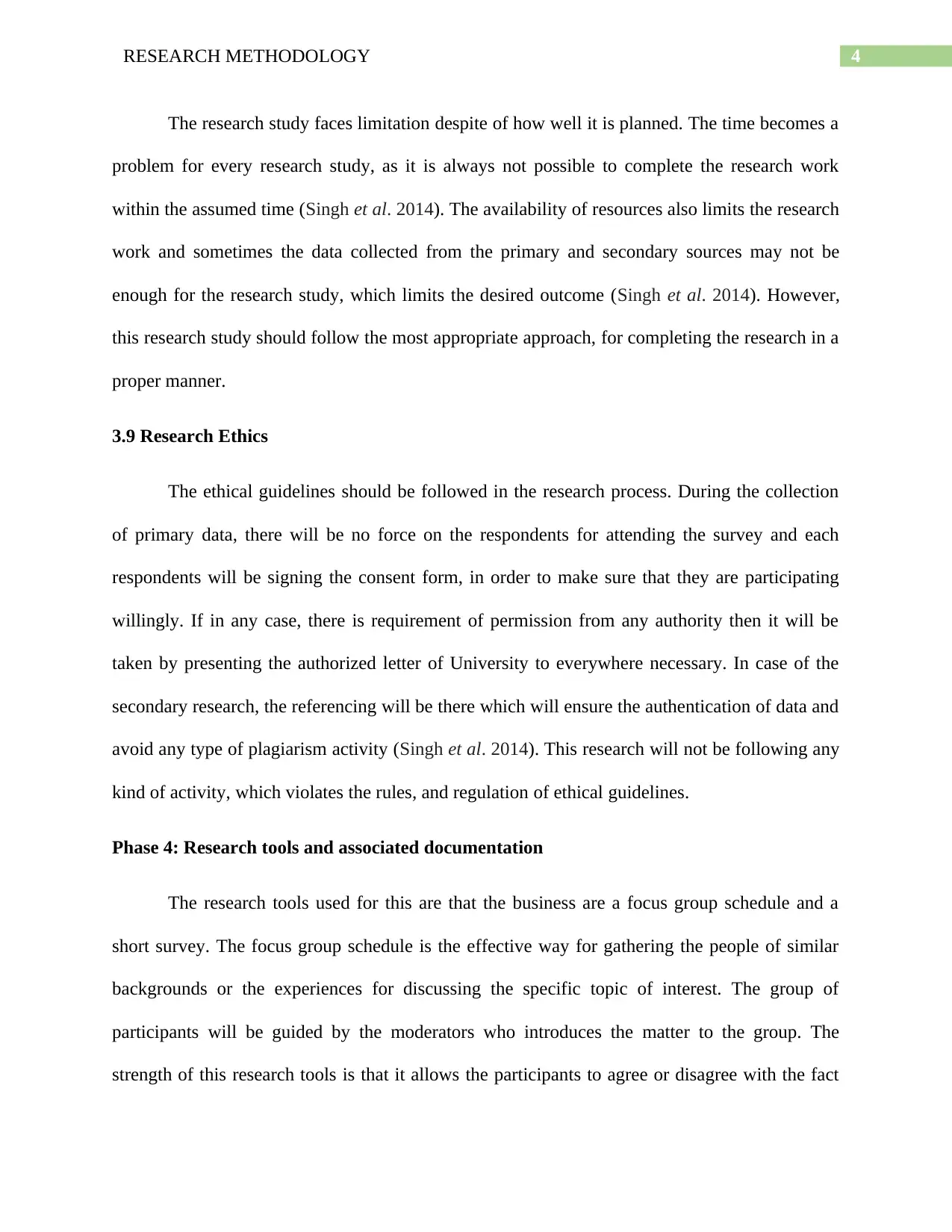
4RESEARCH METHODOLOGY
The research study faces limitation despite of how well it is planned. The time becomes a
problem for every research study, as it is always not possible to complete the research work
within the assumed time (Singh et al. 2014). The availability of resources also limits the research
work and sometimes the data collected from the primary and secondary sources may not be
enough for the research study, which limits the desired outcome (Singh et al. 2014). However,
this research study should follow the most appropriate approach, for completing the research in a
proper manner.
3.9 Research Ethics
The ethical guidelines should be followed in the research process. During the collection
of primary data, there will be no force on the respondents for attending the survey and each
respondents will be signing the consent form, in order to make sure that they are participating
willingly. If in any case, there is requirement of permission from any authority then it will be
taken by presenting the authorized letter of University to everywhere necessary. In case of the
secondary research, the referencing will be there which will ensure the authentication of data and
avoid any type of plagiarism activity (Singh et al. 2014). This research will not be following any
kind of activity, which violates the rules, and regulation of ethical guidelines.
Phase 4: Research tools and associated documentation
The research tools used for this are that the business are a focus group schedule and a
short survey. The focus group schedule is the effective way for gathering the people of similar
backgrounds or the experiences for discussing the specific topic of interest. The group of
participants will be guided by the moderators who introduces the matter to the group. The
strength of this research tools is that it allows the participants to agree or disagree with the fact
The research study faces limitation despite of how well it is planned. The time becomes a
problem for every research study, as it is always not possible to complete the research work
within the assumed time (Singh et al. 2014). The availability of resources also limits the research
work and sometimes the data collected from the primary and secondary sources may not be
enough for the research study, which limits the desired outcome (Singh et al. 2014). However,
this research study should follow the most appropriate approach, for completing the research in a
proper manner.
3.9 Research Ethics
The ethical guidelines should be followed in the research process. During the collection
of primary data, there will be no force on the respondents for attending the survey and each
respondents will be signing the consent form, in order to make sure that they are participating
willingly. If in any case, there is requirement of permission from any authority then it will be
taken by presenting the authorized letter of University to everywhere necessary. In case of the
secondary research, the referencing will be there which will ensure the authentication of data and
avoid any type of plagiarism activity (Singh et al. 2014). This research will not be following any
kind of activity, which violates the rules, and regulation of ethical guidelines.
Phase 4: Research tools and associated documentation
The research tools used for this are that the business are a focus group schedule and a
short survey. The focus group schedule is the effective way for gathering the people of similar
backgrounds or the experiences for discussing the specific topic of interest. The group of
participants will be guided by the moderators who introduces the matter to the group. The
strength of this research tools is that it allows the participants to agree or disagree with the fact
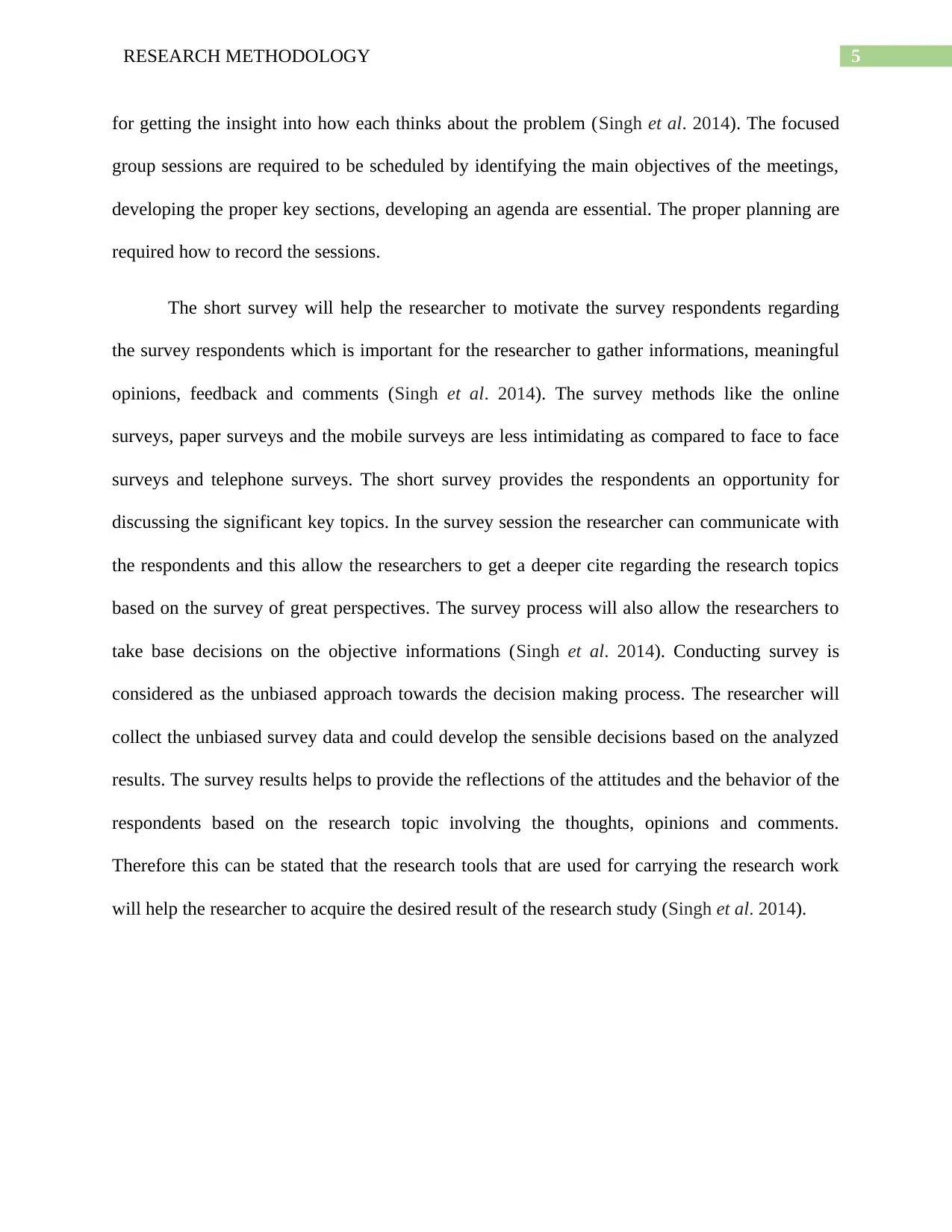
5RESEARCH METHODOLOGY
for getting the insight into how each thinks about the problem (Singh et al. 2014). The focused
group sessions are required to be scheduled by identifying the main objectives of the meetings,
developing the proper key sections, developing an agenda are essential. The proper planning are
required how to record the sessions.
The short survey will help the researcher to motivate the survey respondents regarding
the survey respondents which is important for the researcher to gather informations, meaningful
opinions, feedback and comments (Singh et al. 2014). The survey methods like the online
surveys, paper surveys and the mobile surveys are less intimidating as compared to face to face
surveys and telephone surveys. The short survey provides the respondents an opportunity for
discussing the significant key topics. In the survey session the researcher can communicate with
the respondents and this allow the researchers to get a deeper cite regarding the research topics
based on the survey of great perspectives. The survey process will also allow the researchers to
take base decisions on the objective informations (Singh et al. 2014). Conducting survey is
considered as the unbiased approach towards the decision making process. The researcher will
collect the unbiased survey data and could develop the sensible decisions based on the analyzed
results. The survey results helps to provide the reflections of the attitudes and the behavior of the
respondents based on the research topic involving the thoughts, opinions and comments.
Therefore this can be stated that the research tools that are used for carrying the research work
will help the researcher to acquire the desired result of the research study (Singh et al. 2014).
for getting the insight into how each thinks about the problem (Singh et al. 2014). The focused
group sessions are required to be scheduled by identifying the main objectives of the meetings,
developing the proper key sections, developing an agenda are essential. The proper planning are
required how to record the sessions.
The short survey will help the researcher to motivate the survey respondents regarding
the survey respondents which is important for the researcher to gather informations, meaningful
opinions, feedback and comments (Singh et al. 2014). The survey methods like the online
surveys, paper surveys and the mobile surveys are less intimidating as compared to face to face
surveys and telephone surveys. The short survey provides the respondents an opportunity for
discussing the significant key topics. In the survey session the researcher can communicate with
the respondents and this allow the researchers to get a deeper cite regarding the research topics
based on the survey of great perspectives. The survey process will also allow the researchers to
take base decisions on the objective informations (Singh et al. 2014). Conducting survey is
considered as the unbiased approach towards the decision making process. The researcher will
collect the unbiased survey data and could develop the sensible decisions based on the analyzed
results. The survey results helps to provide the reflections of the attitudes and the behavior of the
respondents based on the research topic involving the thoughts, opinions and comments.
Therefore this can be stated that the research tools that are used for carrying the research work
will help the researcher to acquire the desired result of the research study (Singh et al. 2014).
⊘ This is a preview!⊘
Do you want full access?
Subscribe today to unlock all pages.

Trusted by 1+ million students worldwide
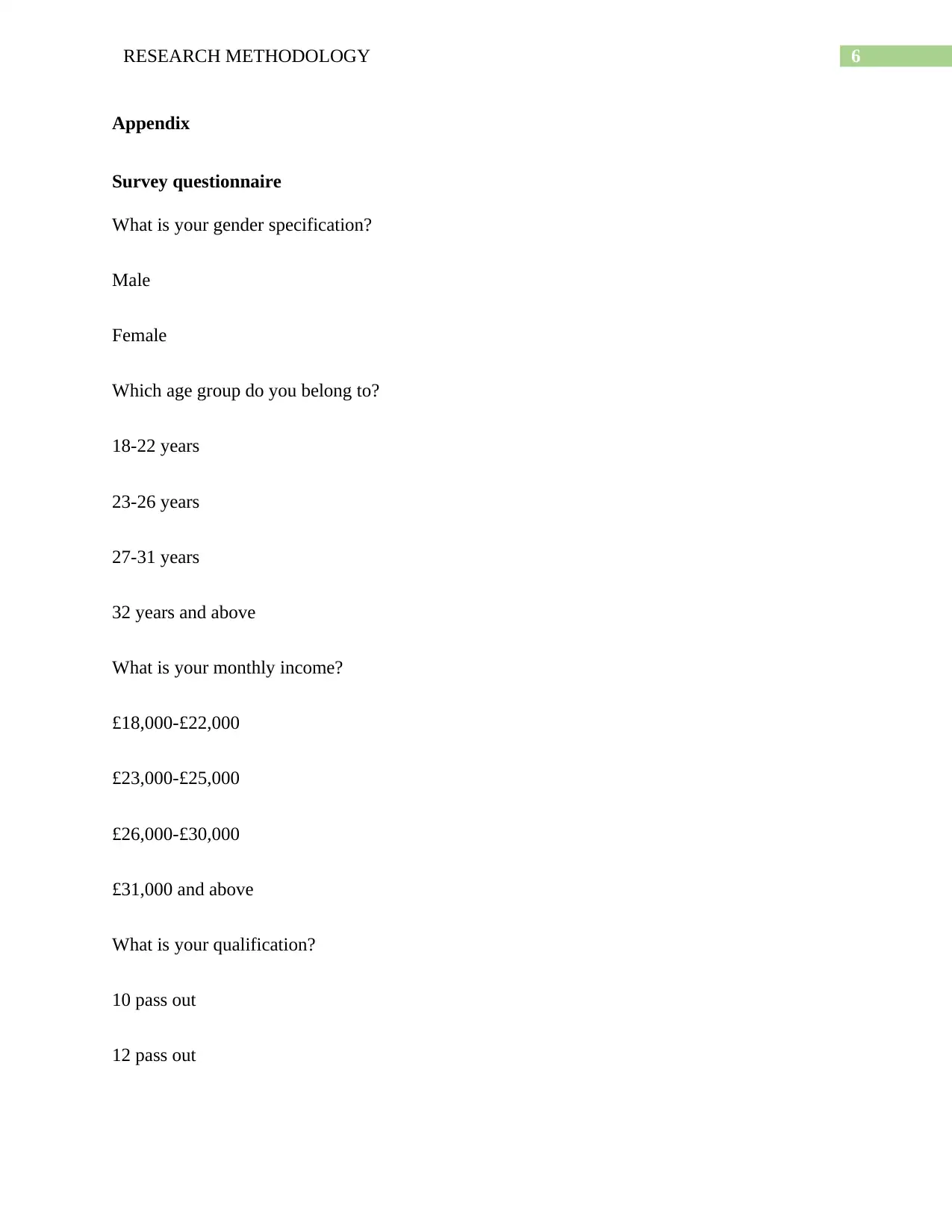
6RESEARCH METHODOLOGY
Appendix
Survey questionnaire
What is your gender specification?
Male
Female
Which age group do you belong to?
18-22 years
23-26 years
27-31 years
32 years and above
What is your monthly income?
£18,000-£22,000
£23,000-£25,000
£26,000-£30,000
£31,000 and above
What is your qualification?
10 pass out
12 pass out
Appendix
Survey questionnaire
What is your gender specification?
Male
Female
Which age group do you belong to?
18-22 years
23-26 years
27-31 years
32 years and above
What is your monthly income?
£18,000-£22,000
£23,000-£25,000
£26,000-£30,000
£31,000 and above
What is your qualification?
10 pass out
12 pass out
Paraphrase This Document
Need a fresh take? Get an instant paraphrase of this document with our AI Paraphraser
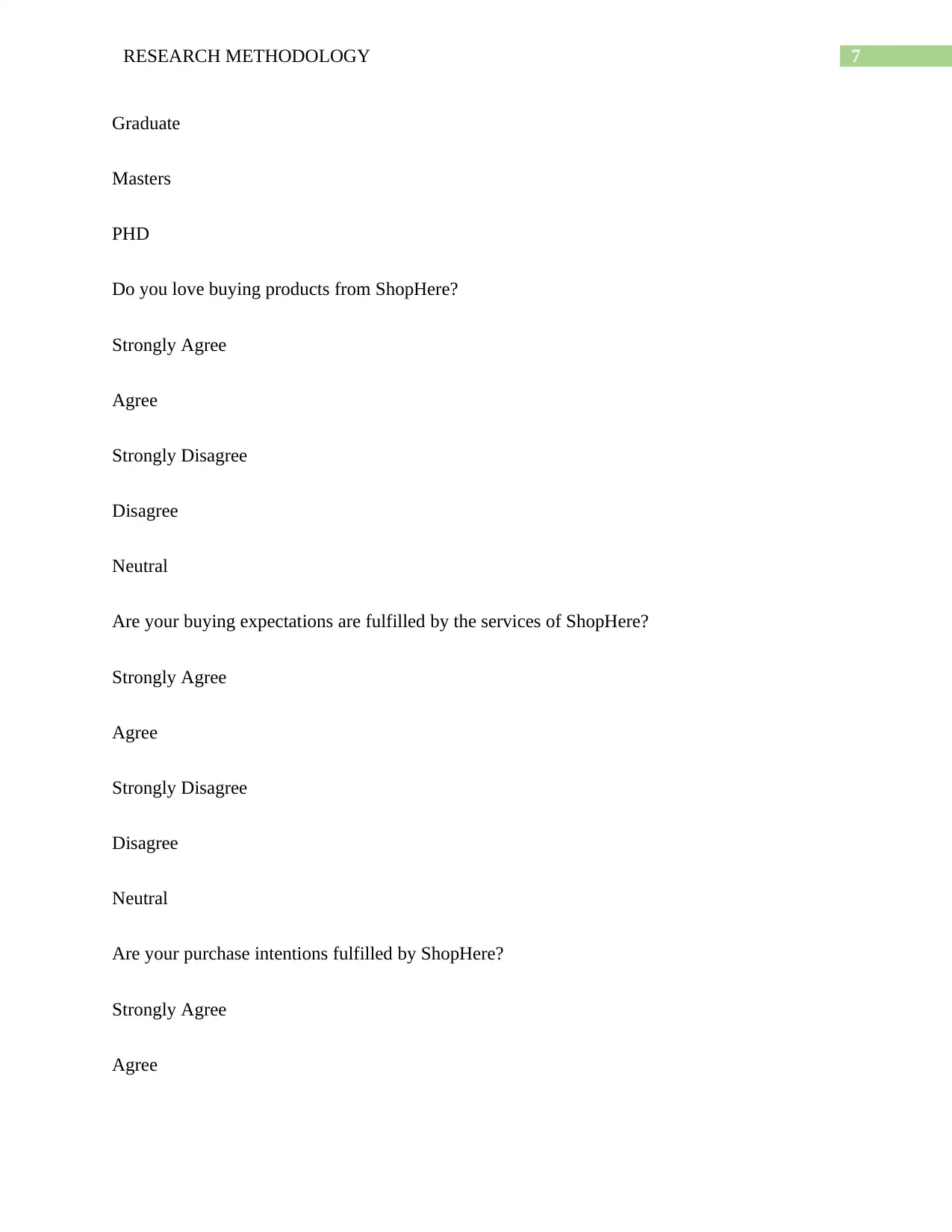
7RESEARCH METHODOLOGY
Graduate
Masters
PHD
Do you love buying products from ShopHere?
Strongly Agree
Agree
Strongly Disagree
Disagree
Neutral
Are your buying expectations are fulfilled by the services of ShopHere?
Strongly Agree
Agree
Strongly Disagree
Disagree
Neutral
Are your purchase intentions fulfilled by ShopHere?
Strongly Agree
Agree
Graduate
Masters
PHD
Do you love buying products from ShopHere?
Strongly Agree
Agree
Strongly Disagree
Disagree
Neutral
Are your buying expectations are fulfilled by the services of ShopHere?
Strongly Agree
Agree
Strongly Disagree
Disagree
Neutral
Are your purchase intentions fulfilled by ShopHere?
Strongly Agree
Agree
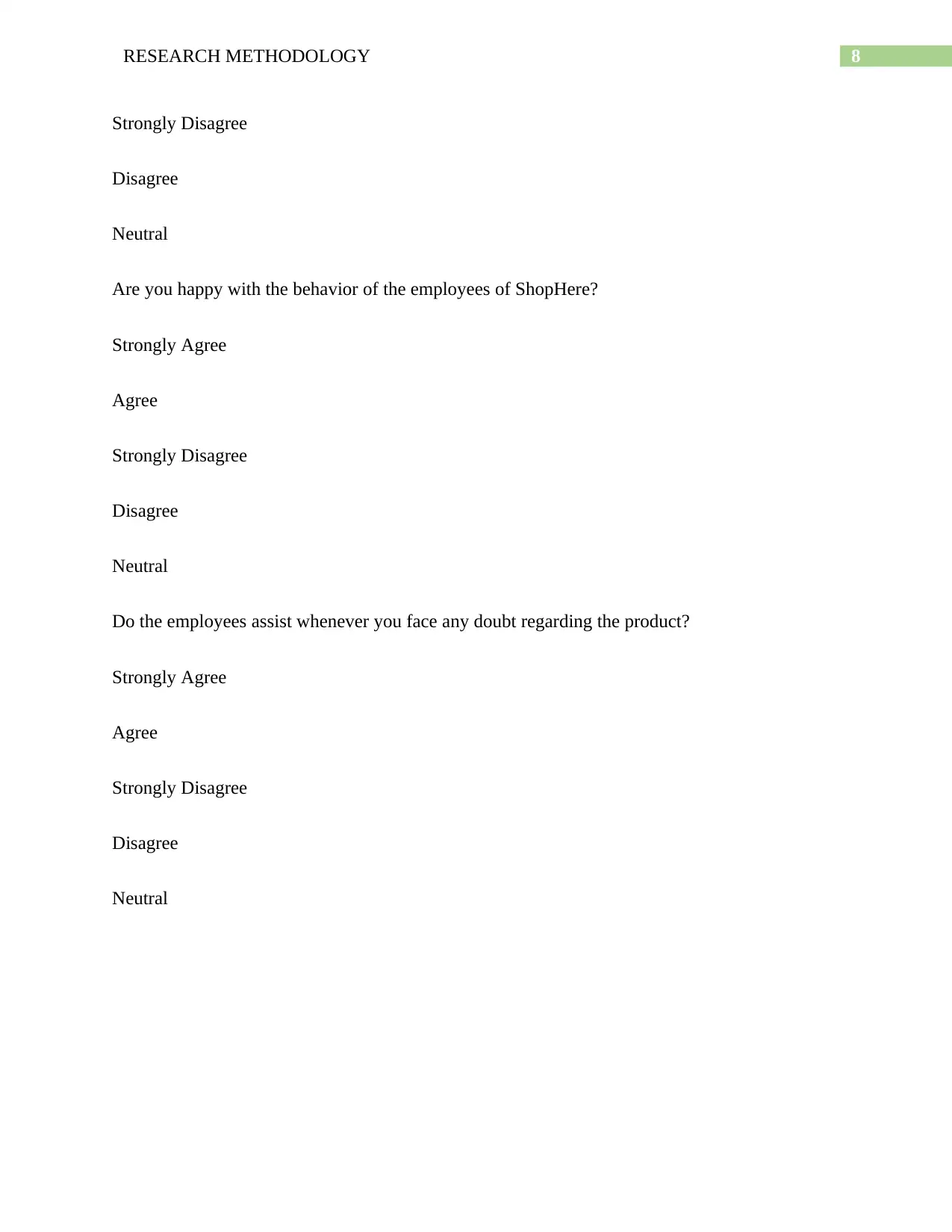
8RESEARCH METHODOLOGY
Strongly Disagree
Disagree
Neutral
Are you happy with the behavior of the employees of ShopHere?
Strongly Agree
Agree
Strongly Disagree
Disagree
Neutral
Do the employees assist whenever you face any doubt regarding the product?
Strongly Agree
Agree
Strongly Disagree
Disagree
Neutral
Strongly Disagree
Disagree
Neutral
Are you happy with the behavior of the employees of ShopHere?
Strongly Agree
Agree
Strongly Disagree
Disagree
Neutral
Do the employees assist whenever you face any doubt regarding the product?
Strongly Agree
Agree
Strongly Disagree
Disagree
Neutral
⊘ This is a preview!⊘
Do you want full access?
Subscribe today to unlock all pages.

Trusted by 1+ million students worldwide
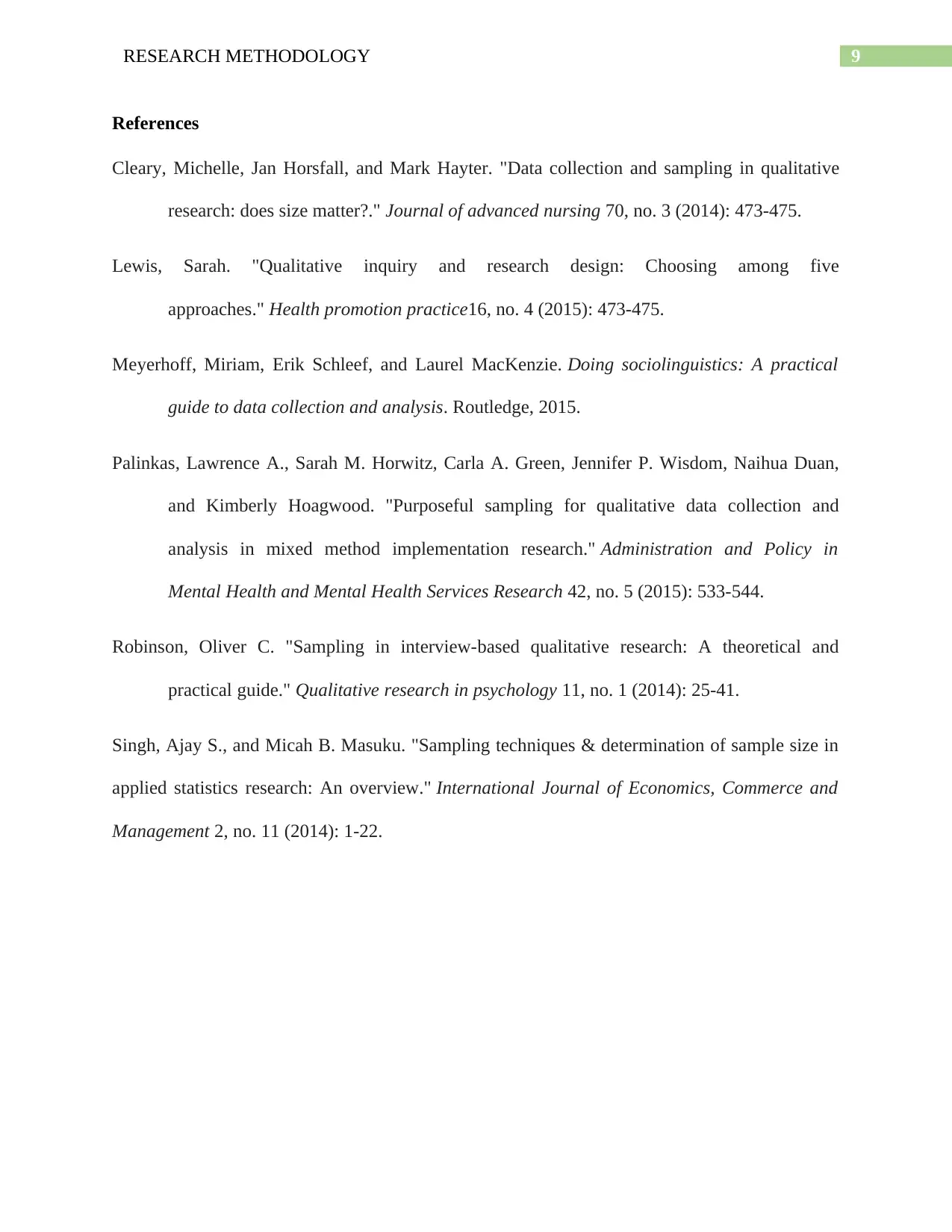
9RESEARCH METHODOLOGY
References
Cleary, Michelle, Jan Horsfall, and Mark Hayter. "Data collection and sampling in qualitative
research: does size matter?." Journal of advanced nursing 70, no. 3 (2014): 473-475.
Lewis, Sarah. "Qualitative inquiry and research design: Choosing among five
approaches." Health promotion practice16, no. 4 (2015): 473-475.
Meyerhoff, Miriam, Erik Schleef, and Laurel MacKenzie. Doing sociolinguistics: A practical
guide to data collection and analysis. Routledge, 2015.
Palinkas, Lawrence A., Sarah M. Horwitz, Carla A. Green, Jennifer P. Wisdom, Naihua Duan,
and Kimberly Hoagwood. "Purposeful sampling for qualitative data collection and
analysis in mixed method implementation research." Administration and Policy in
Mental Health and Mental Health Services Research 42, no. 5 (2015): 533-544.
Robinson, Oliver C. "Sampling in interview-based qualitative research: A theoretical and
practical guide." Qualitative research in psychology 11, no. 1 (2014): 25-41.
Singh, Ajay S., and Micah B. Masuku. "Sampling techniques & determination of sample size in
applied statistics research: An overview." International Journal of Economics, Commerce and
Management 2, no. 11 (2014): 1-22.
References
Cleary, Michelle, Jan Horsfall, and Mark Hayter. "Data collection and sampling in qualitative
research: does size matter?." Journal of advanced nursing 70, no. 3 (2014): 473-475.
Lewis, Sarah. "Qualitative inquiry and research design: Choosing among five
approaches." Health promotion practice16, no. 4 (2015): 473-475.
Meyerhoff, Miriam, Erik Schleef, and Laurel MacKenzie. Doing sociolinguistics: A practical
guide to data collection and analysis. Routledge, 2015.
Palinkas, Lawrence A., Sarah M. Horwitz, Carla A. Green, Jennifer P. Wisdom, Naihua Duan,
and Kimberly Hoagwood. "Purposeful sampling for qualitative data collection and
analysis in mixed method implementation research." Administration and Policy in
Mental Health and Mental Health Services Research 42, no. 5 (2015): 533-544.
Robinson, Oliver C. "Sampling in interview-based qualitative research: A theoretical and
practical guide." Qualitative research in psychology 11, no. 1 (2014): 25-41.
Singh, Ajay S., and Micah B. Masuku. "Sampling techniques & determination of sample size in
applied statistics research: An overview." International Journal of Economics, Commerce and
Management 2, no. 11 (2014): 1-22.
1 out of 10
Related Documents
Your All-in-One AI-Powered Toolkit for Academic Success.
+13062052269
info@desklib.com
Available 24*7 on WhatsApp / Email
![[object Object]](/_next/static/media/star-bottom.7253800d.svg)
Unlock your academic potential
Copyright © 2020–2026 A2Z Services. All Rights Reserved. Developed and managed by ZUCOL.





